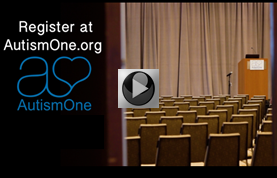My Autism Epiphany by Becky Estepp
To enlarge this document for easy viewing please click Fullscreen below.
parent’s perspective
By Becky Estepp
Talk About Curing Autism’s National Policy Manager, Becky Estepp, also was the former manager of TACA’s Mentor Program, which helps parents new to the diagnosis of autism navigate the myriad of challenges and choices. Please see www.tacanow.org.
n June 2008, I had the pleasure of going to lunch with an amazing autism advocate, Karen Driscoll. Although I am sure Karen doesn’t know it, this lunch would forever change the way I viewed autism. Karen and I had been working on passing federal legislation to get applied behavior analysis (ABA) therapy covered for military families under TRICARE, the United States military’s health insurance plan. Like many of my relationships in autism advocacy, I knew Karen “virtually” – that is, only through e-mail, phone, and text messages. Meeting her face-toface was a pleasure, and it was under the best circumstances for advocates like Karen and me – we were lobbying together on Capitol Hill. I had been to Capitol Hill many times before to advocate for a safer vaccine program. I had always thought I did a fairly good job on getting my points across at these meetings. The legislative staffers’ eyes never glazed over in boredom, and my appointments typically
lasted well over an hour, even though I had been warned that I had 15 minutes to deliver my message. So, I considered my lobbying to be at least somewhat successful. However, on this occasion, I was with Karen and she is a true professional. I recognized it immediately when we walked into the first Congressman’s office and sat down. Karen pulled out a beautiful wire-bound booklet from her briefcase. This booklet contained her presentation on why ABA therapy should be covered by TRICARE. It incorporated every point she wanted to make. Karen’s booklet even had tabs that included stories and photos from families that had been denied ABA, handouts on why ABA is effective, and ABA endorsements from every branch of the military. Her delivery was eloquent and polished. I was very impressed. After our morning meetings, we decided that Mexican food was in order. Karen and I went to a restaurant adjacent to the Hill and sat down to eat. It was at this time that Karen and I got to know each other better. We quickly realized that we had a lot in common. Not only are our husbands both Marines, but they flew the same aircraft and were stationed at the same base in the 1990s. Karen and I are both from Southern California, and our first sons (the sons with autism) were born the same year. I asked Karen a question I always ask my autism advocate friends, “At what age did your son regress, and which vaccine do you think harmed him?” Karen caught me off guard when she answered, “My son showed delays from the beginning and I am not sure if a vaccine harmed him.” This is when I heard that scratching record needle sound in my brain. I thought to myself, “What? You mean my amazing new autism friend might not be a fellow ‘biomedical treatments help and vaccines harmed my child compatriot’?” How could this be? I knew Karen to be intelligent, poised, rational, and full of integrity.
www.autismfile.com
84 • THE AUTISM FILE USA 35 2010
REPRINTED WITH PERMISSION © THE AUTISM FILE
parent’s perspective
I rode home on the train that afternoon with Karen’s words echoing through my head: “My son showed delays from the beginning …” Those words shook the beliefs I had about the causation of autism. Until that day, I really believed that parents who thought their children were different from birth did not want to consider that autism was environmental and, therefore, did not have to happen. I believed these parents to be burying their heads in the sand instead of looking at a horrible truth that I had accepted years and years ago. But I knew Karen was brave; she wouldn’t have buried her head in the sand. So, I started thinking about the things I knew to be true regarding my son Eric’s experience with autism. I made a short mental list of these things. 1. Eric experienced a vaccine reaction; after that reaction he was constantly ill and subsequently became developmentally delayed. 2. Eric was diagnosed with autism at 2 years old. 3. Defeat Autism Now! (DAN!) doctors provided Eric with biomedical treatment and were able to move him out of a state of constant illness and (I think) pain back to being a happier and healthier child. Obviously, Karen had a different experience. How could that be? Karen and I had so many similarities, how could our sons with the same disability have such a different experience in the development of their autistic symptoms? Then it hit me. We were both telling the truth. That sounds like a simple aspect to grasp, but it was very profound for me. At this point, I had been in the autism world for 8 years. Early on, I had staked my autism causation claim with the parents who believed vaccines or other environmental factors contributed to their child’s condition. I never looked back after that, and I did not spend time with the parents who thought otherwise. But now I had a good friend who was most likely on “the other side.” Wow, that was a heavy thought to process. The division between the “genetics/nonregression” parents and the “environmental/ regression” parents runs deep. We are the Hatfields and the McCoys of the disability community. Both sides bicker, engage in name calling, and sling mud – all in the name of helping our children. I have rarely seen an angrier community. And then it made sense: this community is so angry because each side is telling the truth – the truth as it applies to that side’s own unique situation. What an epiphany!
www.autismfile.com
The years of animosity became clear to me. Each side had been accusing the other of the same offense: being delusional. Both sides saw their child develop autism one way and then assumed that is how it must have happened for all the others. I’ll admit it. I made the same assumption. Both sides were angry at each other because they thought they were not being believed. I know how it makes me feel when a doctor, parent, or some other professional tells me that Eric never exhibited typical development and that I was obviously mistaken about his period of normality. It makes me want to scream, “Eric was perfect. He was developing on track and then slowly descended into autism. Why are you not listening to me?” Let’s assume for a second that Eric was delayed since birth. If I were told by someone else that he wasn’t really delayed that early and that he had a regression that I chose to ignore that would make me plenty cranky also. What if this is what both sides are doing to each other? I have a sneaking suspicion that is exactly what we are doing. This epiphany made me start thinking of different health conditions. I immediately thought about diabetes. I wondered … if diabetes has two types, couldn’t autism be similar? I looked up diabetes and found out that type 1 diabetes usually develops when a person is younger and type 2 diabetes manifests later. I also learned that type 2 diabetes occurs when a person has certain risk factors that they cannot change (e.g., a family history of diabetes, ethnicity, age, etc.), and then external factors are introduced (e.g., obesity, poor diet, limited exercise, smoking, etc.) Hmm … genetic risks plus outside or acquired factors – where have I heard of that equation before? The type 2 model of diabetes sounds like what happened to Eric (genetic susceptibility plus an acquired trigger), while the type 1 model sounds a little more like Karen’s son (something that was apparent early on). Another interesting fact is that type 2 diabetes accounts for 95 percent of all cases of diabetes. Then I thought about blindness. Some individuals are born blind because of genetic factors. Others develop blindness from an illness or an accident. Again, we have a condition that occurs early on in development versus a condition that transpired because of external factors. I know that my diabetes and blindness comparison to autism involves absolutely no scientific basis at all. I am merely using these comparisons as analogies. Everything I have written so far is anecdotal. I am not a scientist; I am a mom with a dream of a little bit of unity and a lot more progress in this torn community.
What if the autism community started thinking of autism in two separate categories? “Classic Autism” could describe the individuals who had symptoms evident at birth or shortly afterwards and “Regressive Autism” could describe those who developed typically for a period of time and then changed.
REPRINTED WITH PERMISSION © THE AUTISM FILE
THE AUTISM FILE USA 35 2010 •
85
parent’s perspective
What if the autism community started thinking of autism in two separate categories? “Classic Autism” could describe the individuals who had symptoms evident at birth or shortly afterwards and “Regressive Autism” could describe those who developed typically for a period of time and then changed. I think this could pave the way to better understanding and consideration from both the Hatfields and the McCoys in our community. Both sides could let their defenses down and start opening their minds to the idea that there is more than one path that leads to Autismland. And what if doctors and researchers entertained this dual autism category hypothesis? Potentially, this could be phenomenal. Think about it. The research that goes into “Classic Autism” could still occur and we’d have a virgin research territory to explore concerning what is causing “Regressive Autism.” I could envision tensions easing in the research world. The doctors who have staked their reputations on a genetic model of causation could point to the individuals in the “Classic Autism” category, while the scientists who have been researching environmental factors would have the “Regressive Autism” category to hitch their wagon to. Personally, I would want to see a lot of research funds going into “Regressive Autism” because that would be the newest frontier, and “Classic Autism” has had many years in the research funding limelight. Furthermore, before my allies think I have gone soft (and please know that I haven’t), I think “Regressive Autism” accounts for the overwhelming majority of cases of autism, much like type 2 diabetes accounts for most of the cases of diabetes. I feel that the children under the “Regressive Autism” model have received the short end of the research dollar stick for far too long. That needs to change. As I said before, I am not a scientist. The last time I was in a college level science class George Bush Sr. was in office, so clearly it’s been a while. I haven’t applied any scientific method to my hypothesis. I cannot say with certainty that I am right. But there is something deep down inside of me that is telling me that my epiphany has a lot in it. I can feel it. I am so grateful for that lunch with Karen on that summer day. She really opened my eyes to the way I perceive autism. Because of Karen, the next time I have lunch with a new autism parent, I am going to revise my question from “At what age did your child regress and which vaccine do you think harmed your child?” to “Does your child have ‘Classic Autism’ or ‘Regressive Autism’?” I hope you’ll all do the same.
86 • THE AUTISM FILE USA 35 2010
REPRINTED WITH PERMISSION © THE AUTISM FILE
www.autismfile.com





